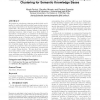Free Online Productivity Tools
i2Speak
i2Symbol
i2OCR
iTex2Img
iWeb2Print
iWeb2Shot
i2Type
iPdf2Split
iPdf2Merge
i2Bopomofo
i2Arabic
i2Style
i2Image
i2PDF
iLatex2Rtf
Sci2ools
124
click to vote
CIKM
2007
Springer
2007
Springer
Randomized metric induction and evolutionary conceptual clustering for semantic knowledge bases
We present an evolutionary clustering method which can be applied to multi-relational knowledge bases storing resource annotations expressed in the standard languages for the Semantic Web. The method exploits an effective and languageindependent semi-distance measure defined for the space of individual resources, that is based on a finite number of dimensions corresponding to a committee of discriminating features (represented by concept descriptions). A maximally discriminating group of features can be obtained with the randomized optimization methods described in the paper. The clustering algorithm represents the possible clusterings as strings of central elements (medoids, w.r.t. the given metric) of variable length. Hence, the number of clusters is not required as a parameter since the method is able to find an optimal choice by means of the evolutionary operators and of a proper fitness function. We also show how to assign each cluster with a newly constructed intensional de...
| Added | 07 Jun 2010 |
| Updated | 07 Jun 2010 |
| Type | Conference |
| Year | 2007 |
| Where | CIKM |
| Authors | Nicola Fanizzi, Claudia d'Amato, Floriana Esposito |
Comments (0)

